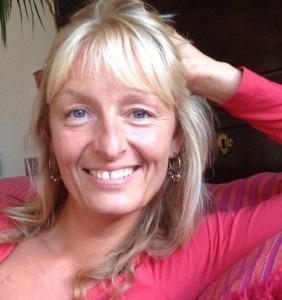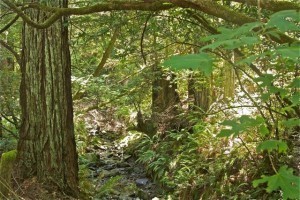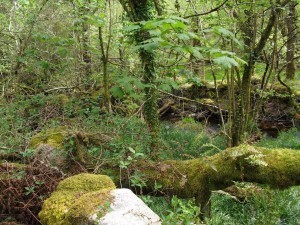Mary Reynolds Thompson's Blog, page 12
February 24, 2015
Should My Fox Come Again to My Cabin in the Snow
Then, the winter will have fallen all in white
and the hill will be rising to the north,
the night also rising and leaving,
dawn light just coming in, the fire out.
Down the hill running will come that flame
among the dancing skeletons of the ash trees.
I will leave the door open for him.
(C) Patricia Fargnoli
How do you leave the door open for wildness to enter?
Patricia Fargnoli writes of a fox. What wild creature do you long to catch a glimpse of?
Write a poem beginning with the line, “Down the hill running will come…” Describe the wild creature you long for in rich imagery and detail. Allow yourself to be curious about why this creature calls to your wild soul.
The post Should My Fox Come Again to My Cabin in the Snow appeared first on Mary Reynolds Thompson.
Into a dark wood, lightly
In the July 2014 edition of Earthlines magazine, Vivienne Palmer tells a story of being accosted by a naked man when walking alone in the woods above Winchester in England. The man knocks her to the ground. He is holding his penis in one hand. She manages to get to her feet and run like a wild animal for safety.
At my convent boarding school in Surrey, the woods were frequented by a man who liked to do much the same, except for the knocking down bit. Because we traveled in groups, this never seemed quite as terrifying.
But as any woman who has felt threatened by a man in a wild place knows, an encounter like this sets off a primal reaction of fear of being attacked and resentment at being made to be afraid.
I have worked all my life to be unafraid of being alone in wild places: walking on the hills of Marin County, figures appearing like ghosts out of the swirling fog; the ecstatic joy of standing alone on a mountaintop in a thunderstorm; wandering at night in dark forests to the crackle of leaves and the snap of twigs. At these times, the fear I have felt has not been so much for the grizzly bear, or the mountain lion, or the wolves that howled in the Bechler Canyon in Yellowstone. This is the healthy wild, and I take my chances. What I fear is the crazy man.
As Palmer goes on to say her Earthlines essay, the reactions a woman receives to being accosted on a remote trail only adds to the damage. If the assault doesn’t result in tangible harm, it’s laughed off or treated by law enforcement with indifference.
We are also told this–“What were you thinking of?” Women are deemed foolish for walking solo in the wilderness. It’s as if we are asking for trouble. It’s as if we are supposed to sacrifice this profound and sacred right to be alone in nature because it’s somehow irresponsible to do otherwise.
Men, of course, have their own set of challenges in the wild places. And it’s not that they can’t also be set upon by some maniac or other. And yet, as women we know the courage it takes––that Cheryl Strayed kind of fearlessness––to step onto the trail by ourselves.
The predators we most fear as we enter a dark wood, lightly, are the two-legged ones.
The post Into a dark wood, lightly appeared first on Mary Reynolds Thompson.
February 11, 2015
Sharon Blackie’s Wild Soul Story
 In 2010, Sharon Blackie, author of The Long Delirious Burning Blue and the forthcoming If Women Rose Rose Rooted, Like Trees, moved with her husband to the remote Isle of Lewis in the Outer Hebrides off Scotland. They were drawn to this isolated place by a desire to get as far away from civilization as possible. But this rocky, barren place had other ideas, as Sharon was to find out when she encountered the face of the goddess Cailleach, the original goddess of the land, on an ancient rock face. To learn more about the amazing Sharon Blackie, please visit her blog, Re-enchanting the Earth; her website, Sharon Blackie: Women Remaking the World, and Earthlines Magazine.
In 2010, Sharon Blackie, author of The Long Delirious Burning Blue and the forthcoming If Women Rose Rose Rooted, Like Trees, moved with her husband to the remote Isle of Lewis in the Outer Hebrides off Scotland. They were drawn to this isolated place by a desire to get as far away from civilization as possible. But this rocky, barren place had other ideas, as Sharon was to find out when she encountered the face of the goddess Cailleach, the original goddess of the land, on an ancient rock face. To learn more about the amazing Sharon Blackie, please visit her blog, Re-enchanting the Earth; her website, Sharon Blackie: Women Remaking the World, and Earthlines Magazine.
The post Sharon Blackie’s Wild Soul Story appeared first on Mary Reynolds Thompson.
First Love
Arriving in Naples, my parents would hire a taxi to take my brother and me to the tiny fishing village of Positano nestled along the Amalfi coastline of Italy. It was a terrifying, seat-of-your-pants journey along a narrow, winding road beneath vertical cliffs and beside a sheer drop into the deep blue Mediterranean. And yet, it was a journey I longed to take, every time. Positano was my place, my happiness, my first love.
How to tell you what that pebbly little beach, under the torrent of cliffs dotted with pastel villas and dripping with lush grapevines meant to me as a little girl? It’s as if Positano called my soul home, warmed me with syrupy light, and lifted by tubby body on its gentle waters so that I lived for days on end, slippery as a sea-lion with Nivea oil and glistening with saltwater.
Far from my London home, where the light was dove gray and all swimming took place indoors, this warm, color-drenched land dunked me in a wild freedom. To rush toward the gentle waves, feeling the spray’s cool bubbles shiver over my sun-baked skin; to doggy paddle out toward the red and blue fishing boats; to lie flat on my back, floating, until the sun spread before my salt blurred eyes like angel wings.
This part of Earth, wrapped itself around my soul. And in its water-kissed shores I felt something raw and essential grow in me. Each year, as we returned to Positano, I felt returned to magic. A sense that there was a place outside the orderliness of my convent schoolgirl life that made life as mystical and strange as a fairy tale. Returning to London, always felt like shutting a door inside of me.
I think, for many of us, this is the true dilemma: There is, if we are lucky, a time in childhood when we experience the true beauty of being alive, of being brought home to oneself. It doesn’t have to take place, as my experience did, in a foreign land. It can happen in a backyard, in the branches of a favorite tree, or in a meadow of waving grasses. Out of doors, away from the constricting walls of our houses, we are opened up to a deeper experience of ourselves through our interaction with the natural world. We don’t know it at the time, but we feel it nonetheless.
This Valentine’s Day we might think of reawakening to that mystery, that sense of deep soul connection with the living world, and ask how we might bring it into our everyday life.
After all, love and relationship isn’t limited to that we feel for other people.
We can be in love with places, too–for how we feel in their presence, for what they teach us, bring forth in us.
Positano was my first love. What was yours?
The post First Love appeared first on Mary Reynolds Thompson.
Elegy for a Walnut Tree
Old friend now there is no one alive
who remembers when you were young
it was high summer when I first saw you
in the blaze of day most of my life ago
with the dry grass whispering in your shade
and already you had lived through wars
and echoes of wars around your silence
through days of parting and seasons of absence
with the house emptying as the years went their way
until it was home to bats and swallows
and still when spring climbed toward summer
you opened once more the curled sleeping fingers
of newborn leaves as though nothing had happened
you and the seasons spoke the same language
and all these years I have looked through your limbs
to the river below and the roofs and the night
and you were the way I saw the world.
“Elegy for a Walnut Tree” by W.S. Merwin, from The Moon Before Morning. © Copper Canyon Press, 2014.
* In honor of Valentine’s Day, write a love poem or love letter to a place, or a tree, or an animal that feels like an “old friend.” What do you want to tell them? What have they gifted you with?
Please share your “old friend” with us below.
The post Elegy for a Walnut Tree appeared first on Mary Reynolds Thompson.
February 4, 2015
Escape
When we get out of the glass bottles of our own ego,
and when we escape like squirrels from turning in the
cages of our personality
and get into the forest again,
we shall shiver with cold and fright
but things will happen to us
so that we don’t know ourselves.
Cool, unlying life will rush in,
and passion will make our bodies taut with power,
we shall stamp our feet with new power
and old things will fall down,
we shall laugh, and institutions will curl up like burnt paper.
(c) D.H. Lawrence
If you were to escape, what landscape would you escape into–and why?
When has passion made your body taut with power. Write about a moment like that–how did you feel, where were you, who was present?
Begin a poem with the line, “When I get into the forest again…” Allow the poem to take you on a journey into your truest, wildest self.
The post Escape appeared first on Mary Reynolds Thompson.
Clare Dakin
 In 2000, feeling as if she has lost her bearings, Clare Dakin attended a 5-Rhythms dance retreat. While there, she would play the role of Mother Earth in an improv piece titled, “Rape of the Earth.” The experience was so powerfully painful it broke Clare open in extraordinary ways––ways that would eventually lead to her founding TreeSisters, an organization that works both to help women reclaim their unique feminine nature and to reforest the planet. To find out more about Clare’s work, please visit her at TreeSisters, and on Twitter, Facebook and the community Facebook page. As well, you can watch the film version of this story on YouTube.
In 2000, feeling as if she has lost her bearings, Clare Dakin attended a 5-Rhythms dance retreat. While there, she would play the role of Mother Earth in an improv piece titled, “Rape of the Earth.” The experience was so powerfully painful it broke Clare open in extraordinary ways––ways that would eventually lead to her founding TreeSisters, an organization that works both to help women reclaim their unique feminine nature and to reforest the planet. To find out more about Clare’s work, please visit her at TreeSisters, and on Twitter, Facebook and the community Facebook page. As well, you can watch the film version of this story on YouTube.
The post Clare Dakin appeared first on Mary Reynolds Thompson.
Keeping Language Wild
The river gushes and rushes and makes rivers of our tongues. We are wise as owls, thunderously angry, our skin ages like bark. Is it possible that our capacity for symbolic language, which we often view as that which separates humans from all other beings, is what most powerfully ties us to the Earth?
Language, after all, is rooted in nature’s imagery, from the obvious metaphors to the etymological roots of words. When we speak or write, we draw to us the great web of words that arises from natural symbols, natural sounds and onomatopoeia, the symbols and the rhythms of nature.
Language breathes. It draws inspiration from the breath of the world. It is embodied, ensouled––rich and fecund with wildness and tendrils of association that speak to an ecology of mind: an ability to make wild leaps of connection, to breach false divides and illusions of separation.
Writes Gary Snyder in his brilliant essay “Tawny Grammar” in The Practice of the Wild.
“Language is not a carving, it’s a curl of breath, a breeze in the pines.”
More and more, reduced to soundbites and talking points, our language rebooted in technology and abstracted techno-linguistics, we find ourselves drifting further from language that reaches deep into the Earth. In her essay “The Sacred Bee” from the book Biophilia Hypothesis, Elizabeth Lawrence writes, “If we continue our current policy of destructiveness toward nature, does this mean that human language will contain fewer and fewer symbolic references to animals [and to the natural word] with consequent impoverishment of thought and expression?”‘
Will we lose part of ourselves if language, too, is uprooted from the Earth?
As a facilitator of poetry therapy, I believe the aim of poetry is to invoke language that penetrates to the wild places in us––that awakens us to our own wild nature. Poets or not, we each have within us the power for keeping language wild.
We can:
Learn the names of our other-than-human neighbors;
Write poems, speak them out loud, feel them thrum in our bodies;
Express our love for the Earth through dance, song, poetry;
And we can share our Wild Soul Stories, the stories that speak to our oneness with the Earth.
How will you keep your language wild?
The post Keeping Language Wild appeared first on Mary Reynolds Thompson.
January 21, 2015
The Place I Want to Get Back To

is where
in the pinewoods
in the moments between
the darkness
and first light
two deer
came walking down the hill
and when they saw me
they said to each other, okay,
this one is okay,
let’s see who she is
and why she is sitting
on the ground like that,
so quiet, as if
asleep, or in a dream,
but, anyway, harmless;
and so they came
on their slender legs
and gazed upon me
not unlike the way
I go out to the dunes and look
and look and look
into the faces of the flowers;
and then one of them leaned forward
and nuzzled my hand, and what can my life
bring to me that could exceed
that brief moment?
For twenty years
I have gone every day to the same woods,
not waiting, exactly, just lingering.
Such gifts, bestowed,
can’t be repeated.
If you want to talk about this
come to visit. I live in the house
near the corner, which I have named
Gratitude.
(c) Mary Oliver
Write about an enchanted moment when you encountered a wild creature on your wanderings/ What happened? What did you notice? How did you feel?
The poet imagines the deer saying to each other, “this one is okay.” What do you imagine the wild creature you encountered said about you? Write your reflections in your journal.
What is the most intense emotional experience you’ve had with a wild animal? Write a poem beginning with the words, “If you want to talk about this…”
Please share your writings and observations by leaving a comment below.
The post The Place I Want to Get Back To appeared first on Mary Reynolds Thompson.
Is It Bad to Love Bambi?
As a little girl I watched the Walt Disney film Bambi for the first time at the Gaumont Theater (now the Coronet) in Notting Hill Gate in London. I was ten years old. On that day, Flower the skunk, Thumper the rabbit, and Bambi, with his long lashes and spindly legs, became indelibly etched in my heart. I cried inconsolably when Bambi’s mother was shot by hunters.
So does this mean I have Bambi Syndrome, as scientists disparagingly call it? Is it possible that you may have it too?
What scientists and wildlife managers call Bambi Syndrome, according to Stephen R. Kellert in his book Birthright, is essentially their term for anthropomorphism––imbuing animals and other non-human beings with human feelings. They describe the syndrome as being responsible for what they deem the hysterical response to everything from the hunting of wolves to the felling of forests. An emotional response is meant to be irrational, and therefore unworthy of consideration.
But is this really so?
Is it really irrational to imagine that a young doe on losing his or her mother will feel afraid and lost? Haven’t we seen mother bears distraught at the loss of a cub? And haven’t we all read stories of inter-species friendships that seem to clearly point toward the fact that animals––just like us humans––will go to great lengths to experience play, affection, companionship?
Don’t aspen trees share one massive beating rooted heart? Aren’t we too connected by something deep and ancient?
Rationality is overrated. What we need now is to put relationship first. Love before logic.
Jane Goodall was presented with a large stuffed chimpanzee by her father when she was just one year old. Jubilee and Jane became inseparable. I’m sure Jane Goodall talked to Jubilee, loved him silly, and worried about his health and happiness. I am also very certain that Jubilee set Jane on her path to becoming the most famous chimpanzee expert in the world.
Today, I can’t see a deer on my daily walks without being brought back to the sense of aliveness I experienced watching Bambi––that young fawn’s sadness, his joy, his love of the forest, my own. His world, my enchantment. And enchantment is vital. To live in an enchanted world, where everything has an inner life and sacredness, is the beginning of developing an ecological perspective.
The word enchantment comes from the French word chanter, to sing. When we are enchanted, we sing the world alive.
And that’s what scientific rationalism will never manage to do.
If you have a story of falling in love with a fictional creature–either in the movies or literature–please share it here.
The post Is It Bad to Love Bambi? appeared first on Mary Reynolds Thompson.




